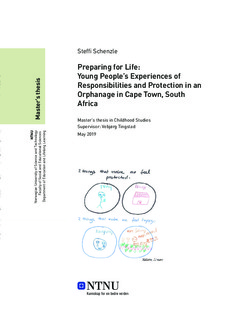| dc.description.abstract | The black and coloured population of South Africa are facing severe obstacles and disadvantages in terms of unemployment, education and health. More than half of the black children are living below the poverty line. Due to the high levels of inequalities and increased rates of HIV-positive people the amount of orphans has been rising steadily. Orphaned children are facing severe circumstances, such as acute poverty and economic challenges. This study aims to examine the experiences of children living in an orphanage in South Africa. It aims to gain an understanding of how the children living there define and understand the terms ‘responsibilities’ and ‘protection’ and how they experience them at this place. Also, the study wants to engage a discussion about how these experiences can be understood in the context of children’s rights and how they could be challenging ‘Westernized’ ideas. The research was carried out in an orphanage in Cape Town, southern South Africa. 19 children were participating in this research, aged between 8 and 18 years. The sample consisted of 8 male and 11 female participants who have been living in this orphanage between 2 and 8 years. The basis of this study was created by theoretical approaches from Childhood Studies, seeing childhood as a social structure and children as social actors. It was conducted as a qualitative research project, using the following child-friendly methods engaging the children to participate in the study: Emotion cards, drawings, life stages as well as research interviews. The findings of this research present ‘protection’ as defined as keeping something safe. The children said that everybody needs protection and focused the term mainly on physical protection against violence and danger. The term ‘responsibilities’ was used by the children as taking care for something and was employed as a concept everybody has to fulfil in order to be prepared for the life as an adult. Most of the children were glad to be able to stay in this orphanage and receive its protection. However, the participants experienced a lack of guidance and interest from the workers. Yet, the children have accepted these issues as part of their lives. The findings also show a close connection to both the UNCRC and the ACRWC in regard to the protection needs of the children. Still, only the African Charter includes responsibilities and respect which were visible in the results of the study. The study suggests seeing the UNCRC as a useful instrument to create a basis for children’s rights. However, it recommends adapting the implementation of the Convention to the local context. More research is necessary to investigate more into experiences of children living in an orphanage setting. | nb_NO |
